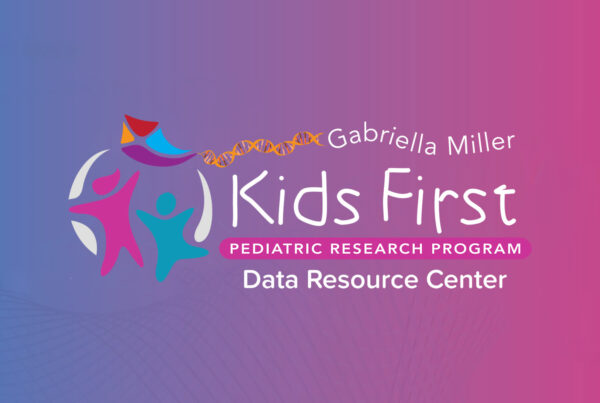Kids First DRC Poster at the NIH and NCATS Rare Disease Day
Rare Disease Day takes place on the last day of February each year. The main objective of Rare Disease Day is to raise awareness amongst the general public and decision-makers about rare diseases and their impact on patients’ vidas. Since Rare Disease Day was first launched by EURORDIS y es Consejo de Alianzas Nacionales en 2008, thousands of events have taken place throughout the world.
On February 28, 2019, in the Natcher Conference Center at the main campus of the National Institutes of Health (NIH) in Bethesda, Maryland, the National Center for Advancing Translational Sciences (NCATS) and Clinical Center sponsored an conferencia y exposición de todo el día para crear conciencia sobre las enfermedades raras, las personas a las que afectan, y las colaboraciones de investigación de los NIH en curso para abordar desafíos científicos y avanzar en nuevos tratamientos..
At this event, which saw roughly 500 defensores de los pacientes, familias, representantes de la agencia, investigadores, y médicos presentes, el Centro de recursos de datos Gabriella Miller Kids First, financiado por el Fondo Común de los NIH (Niños primero RDC) presented a poster to highlight collaborative research opportunities for childhood cancer and structural birth defect researchers, así como datos genómicos y fenotípicos., and other features available within the Kids First Data Resource Portal.
“What’s wonderful about an event like this is that it serves as a reminder of the incredible wealth of talent and knowledge that exists within the rare disease community that is striving to find cures and improved treatments for individuals who experience rare and often life-threatening conditions. Rare Disease Day also reminds us that through open scientific collaboration and continued patient, foundation, and institutional support, we can accelerate research and improve lives across the country and beyond,” said Adam Resnick, PhD of Children’s Hospital of Philadelphia and Principal Investigator of the Gabriella Miller Kids First Data Resource Center.
Those attending the NIH’s Rare Disease Day had the opportunity to meet with representatives from the NIH, Dr. Resnick, and Kids First DRC Administrative and Outreach Core (AOC) Lead Jena Lilly, EM, CCRC, to learn more about the collaborative research opportunities and data available through the Kids First Data Resource. Los asistentes también pudieron realizar preguntas y conocer cómo pueden registrarse y acceder a datos para su análisis..
The Kids First DRC is a collaborative pediatric research effort with the goal of understanding the genetic causes and links between childhood cancer and structural birth defects. The DRC is charged with:
- Developing data-driven platforms to integrate large amounts of genomic and clinical data from different disease types
- Empowering the collaborative discovery, compromiso, and necessary partnerships across disease communities that are crucial to advance pediatric research
- Enabling rapid translation to personalized treatments for patients diagnosed with childhood cancer or structural birth defects
- Accelerating discovery of genetic causes and shared biologic pathways within and across these conditions
There are over 839TB of data files from 10 conjuntos de datos, compuesto por datos genómicos de 2,789 familias y 7,835 Participantes del estudio de pacientes con cáncer infantil y defectos estructurales de nacimiento dentro del portal de recursos de datos Kids First. Genomic data in the Portal is aligned with Human Genome Reference HG38 and also contains comprehensive phenotypic data that is harmonized using community-based ontologies and standards such as the Human Phenotype Ontology (HPO) y/o el Tesauro del NCI. Los esfuerzos de armonización fenotípica de la República Democrática del Congo permiten un análisis más sencillo de diferentes conjuntos de datos y tipos de enfermedades., tanto dentro del Centro de recursos de datos como en otros conjuntos de datos genómicos.
Para obtener más información sobre los datos disponibles, y registrarse para utilizar el portal de recursos de datos Kids First, visita https://kidsfirstdrc.org/support/getting-started/.










